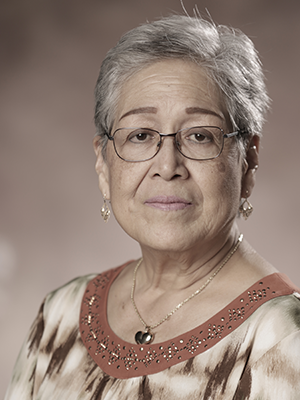Born on the March to Manenggon

Rosanne Borja Santos Ada, (1944 – 2021), was born at the end of June 1944, the eighth child of Ana Sablan Borja Santos and Mariano Barcinas Santos. Pregnant with Rosanne, Ana and Mariano were forced to march along with their seven other children from Sumai to Fena and to the Manenggon concentration camp. She was born en route to the camp.
My family and other Sumai residents were grouped together to be massacred, During the march, my mother became so malnourished and couldn’t produce breast milk.
Rosanne Santos Ada
Roseanne was fed by three wet nurses, who eventually became her Godmothers.
One of the significant memories of the march that her mother shared with her was when one of her family members, Juan Roberto and his wife, who was light skinned and of Spanish decent, looked up in the sky when the Americans were attacking Guam. Mrs. Roberto, who was pregnant, was shot and killed by US bombers. Her three young children survived.
During the occupation, the Japanese troops influenced the CHamoru people and their lifestyle. Her mom knew how to speak Japanese from hearing them speak on a daily basis. They also needed to learn the language to be aware of what was going on and protect themselves from the Japanese troops.
The Japanese forced the young girls and boys to work in the rice fields. My mom was pregnant and didn’t have to go out on the rice fields. Other children were forced to learn Japanese in school.
War experience impacted them for the rest of their lives
Her mother and father’s experience of war would eventually impact how Ada and her siblings were raised and taught how to live.
During the war, we didn’t have food; we were all starving. After the damage of the bombing, nothing was alive – no animals, no vegetation; and the Japanese took all of the people’s livestock. We had only the clothes on our body.
Her father didn’t have any money with them physically because they all had to bury money somewhere so the Japanese troops would not take it from them.
If the Japanese saw you in possession of American money, you can get killed.
We were taught survival skills like how to save and ration our food. We were told not to take so much food if you won’t be able to eat it. When the Americans came to liberate Guam, the CHamoru people were given canned rations.
The liberation of the CHamoru people from the Japanese influenced Ada’s family’s faith and religion. Ada went to Mt. Carmel School in Hågat and Cathedral Grade School in Hagåtña.
The nuns from Notre Dame were American-born nuns and we learned Catholicism and English from them.
Editor’s note: Reprinted and adapted, with permission, from Guam War Survivors Memorial Foundation by Christine Restuvog Quinata.
